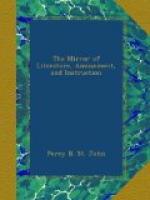The Bondsman’s Feast.
Arthault’s only child was a son, who owed nothing to his father but the prospect of a fair inheritance, for he was little like him in form, and not at all in mind: he was a fine, manly, generous, and high-spirited youth—such as would have been thought too early born, had his appearance been made before the hereditary servility of his family was forgotten. The knight, too, had an only child, a daughter; who, in personal appearance and moral qualities, contrasted in as remarkable a manner with her father. She was little almost to a fault, in the standard of beauty, if there be such a thing; her form was moulded with a delicacy, which gave the idea of one of those aerial shapes that dance in the beam of poesy: and there was that gentle and refined playfulness of expression in her fair countenance, which artists have loved to picture in the nymphs of some silvan goddess, whose rudest employment is to chase one another on the green bank, or sport in the transparent wave.
Guillaume loved the beautiful bourgeoise before he knew that such love was a condescension; and Amable, when, on being desired by her father to refuse her heart to Guillaume, she thought of inquiring whether she possessed such a thing at all, started with surprise to find that she had given it away to the knight’s son long ago. But where was the use of repining? Guillaume was young, and handsome, and generous, and brave; and what harm could befall her heart in such keeping? Amable turned away from her father with a light laugh, and a light step, and stealing skippingly round the garden wall—for already the paternal prohibitions had gone forth—bounded towards a grove of wild shrubs at the farther end.
The trees were bathed in sunlight; the air was filled with the song of birds; the face of heaven was undimmed by a single spot of shade, and the earth was green, and sparkling, and beautiful beneath. Such was the scene around her; but in Amable’s mind, a warmer and brighter sun shed its light upon her maiden dreams, and the voice of the sweet, rich singer Hope drowned the melody of the woods. “Away!” she thought; “it cannot be that this strange, unkindly mood can endure; my father loves his friend in spite of all, and the noble and generous knight could not hate if he would. They shall not be a week apart when they will both regret what has passed; and when they meet again, I will laugh them into a confession that they have done so. Then the two friends will embrace; and then Guillaume and I will sing, and dance, and read together again—and then—and then—and then—” It seemed as if her thoughts had run her out of breath; for at this point of the reverie she paused, and hung back for a moment, while a sudden blush rose to her very eyes. Soon, however, she recovered; she threw back her head gaily, and yet proudly; legends of happy love crowded upon her memory, and minstrel songs echoed in her ear; she bounded lightly into the wood, and as some one, darting from behind a tree, caught her while she passed, Amable, with the stifled scream of alarm, which maidens are wont to give when they wish it unheard by all save one, found herself in the arms of Guillaume. * * * *




